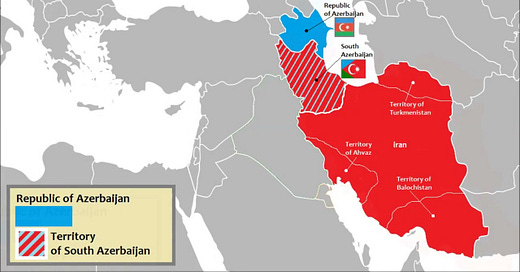Geopolitical Narratives: The Battle Over Azerbaijan’s Sovereignty and Influence
The geopolitical tensions between Azerbaijan and Iran, especially under the influence of pan-Turkism, create a complex nexus of both border disputes and narratives. This struggle for control over regional perceptions is emblematic of broader security and political strategies. Disinformation has become a central element in shaping these dynamics. Iran’s portrayal of Azerbaijan as a pan-Turkist aggressor aligns with Tehran’s broader concerns about its own internal ethnic composition, particularly the significant Azerbaijani minority. This framing serves not just as a geopolitical deflection but as a calculated attempt to suppress ethnonationalism within Iran’s borders. By casting Azerbaijan as a pan-Turkist agitator, Tehran attempts to maintain domestic unity while projecting an external threat to justify its continued interference in Azerbaijani affairs. From Azerbaijan’s perspective, Iran’s narrative exaggerates Baku’s intentions, fabricating the notion of pan-Turkism to obscure Tehran’s own regional aspirations. Iran’s disinformation aims to fracture Azerbaijan’s relations with Turkey and create internal instability by exacerbating fears of ethnic division within Azerbaijan. Tehran’s tactics, including the use of state media and its networks of pro-regime outlets, reflect a broader strategy to undermine Azerbaijan’s legitimacy on the international stage while reinforcing Iran’s influence in the South Caucasus.
Iran’s disinformation campaign has another dimension: the portrayal of Azerbaijan’s alliances, particularly with Turkey, as existential threats. This narrative attempts to manipulate sectarian differences and foster divisions within Azerbaijan’s Shia population. However, this tactic largely fails, as Azerbaijan maintains a secular national identity and prioritises pragmatic alliances that transcend religious considerations. Iran’s use of sectarian disinformation is not solely about regional geopolitics but is aimed at maintaining control over domestic unrest among its Azerbaijani population. The myth of pan-Turkism, heavily promoted by Iranian state media, serves as a powerful tool for Tehran to deflect from its own regional destabilisation efforts, particularly in places like Iraq, Syria, and Lebanon. By fabricating a pan-Turkist threat, Iran seeks to distract from its broader geopolitical manoeuvres, positioning itself as a defender of stability while actively contributing to instability in neighbouring regions. At the heart of this conflict is not just ideological divergence but economic rivalry, particularly concerning regional energy routes. Azerbaijan’s role as a critical transit hub for oil and gas bypasses Iran, diminishing Tehran’s influence in the energy market. This economic competition underscores the disinformation campaign, as Iran seeks to disrupt Azerbaijan’s strategic partnerships, particularly with Turkey and Europe, through propaganda that portrays Baku as a destabilising force.
Iran’s disinformation efforts against Azerbaijan reflect deeper insecurities about its own territorial integrity and regional influence and by framing Azerbaijan as a pan-Turkist threat, Iran aims to consolidate domestic unity, suppress ethnic unrest, and maintain leverage over regional geopolitics, particularly in the South Caucasus. The underlying narrative is a calculated strategy of deflection, using disinformation to manipulate both domestic and international perceptions.




